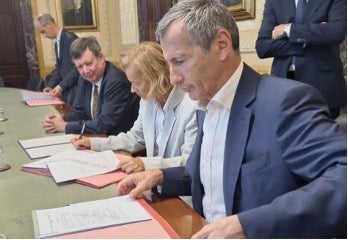
Italy’s Edison, France’s Framatome and Politecnico di Milano have signed a cooperation agreement for scientific and technological research and training in the field of nuclear energy. They will pool their technical knowledge and expertise in order to jointly develop research, development and innovation activities for the nuclear sector.
The agreement provides for joint projects through internships, master’s degree and doctoral dissertations, seminars, workshops and other similar initiatives on technical topics of mutual interest. It will also provide for the organisation of meetings and training courses as well as visits for students and their respective employees to Framatome’s production sites and plants and the Politecnico di Milano’s and Edison’s research laboratories.
“This agreement represents another step towards cooperation and research on new nuclear power and – with the support of universities – the development of the necessary expertise for new nuclear power in Italy.,” said Lorenzo Mottura, Executive Vice President for Strategy, Innovation, Research & Development and Digital at Edison. “Thanks to this agreement students at the Politecnico di Milano will benefit from direct access to and exchange with Edison – a leading operator in the Italian energy sector that is actively engaged in the development of new nuclear power in Italy – and Framatome, a European leader in the development and industrialisation of nuclear technology.”
Elisabeth Terrail, Senior Executive Vice President, Human Resources at Framatome said Politecnico di Milano is a prestigious university that promotes academic excellence in education and in the field of nuclear engineering. “Thanks to this agreement, students at the Politecnico will be called upon to apply what they have learnt to real projects in support of the existing fleet and the development of nuclear energy in Europe,” she noted.
“The Politecnico di Milano, the first university in Italy to engage in university education and research in the nuclear sector since the 1950s, confirms and increases its historical strength and attractiveness, both towards the new generations – tripling the number of students enrolled in this field in the last five years – and towards industrial stakeholders, committed to evaluating and developing new nuclear technologies, which are fundamental to contributing to the solution of the energy problem, in terms of environmental sustainability, strategic safety, and socio-economic impact,” said Marco Ricotti, Professor of Nuclear Engineering at the Politecnico di Milano.
Italy was a leading nuclear power-producing country in the 1960s but chose to phase out all nuclear plants after a 1987 referendum following the Chernobyl disaster. It closed its last two operating plants, Caorso and Trino Vercellese, in 1990. The fourth Berlusconi government attempted to launch a new nuclear power programme but that was also rejected by a referendum in 2011, shortly after the Fukushima accident.
However, in May 2023, the Italian Parliament approved a motion urging the government to consider incorporating nuclear power into the energy mix. In September, the first meeting was held of the National Platform for a Sustainable Nuclear, set up to consider the possible resumption of nuclear energy in Italy. The government included potential new nuclear capacity in its National Integrated Energy & Climate Plan, which was submitted to the European Commission on 1 July.






